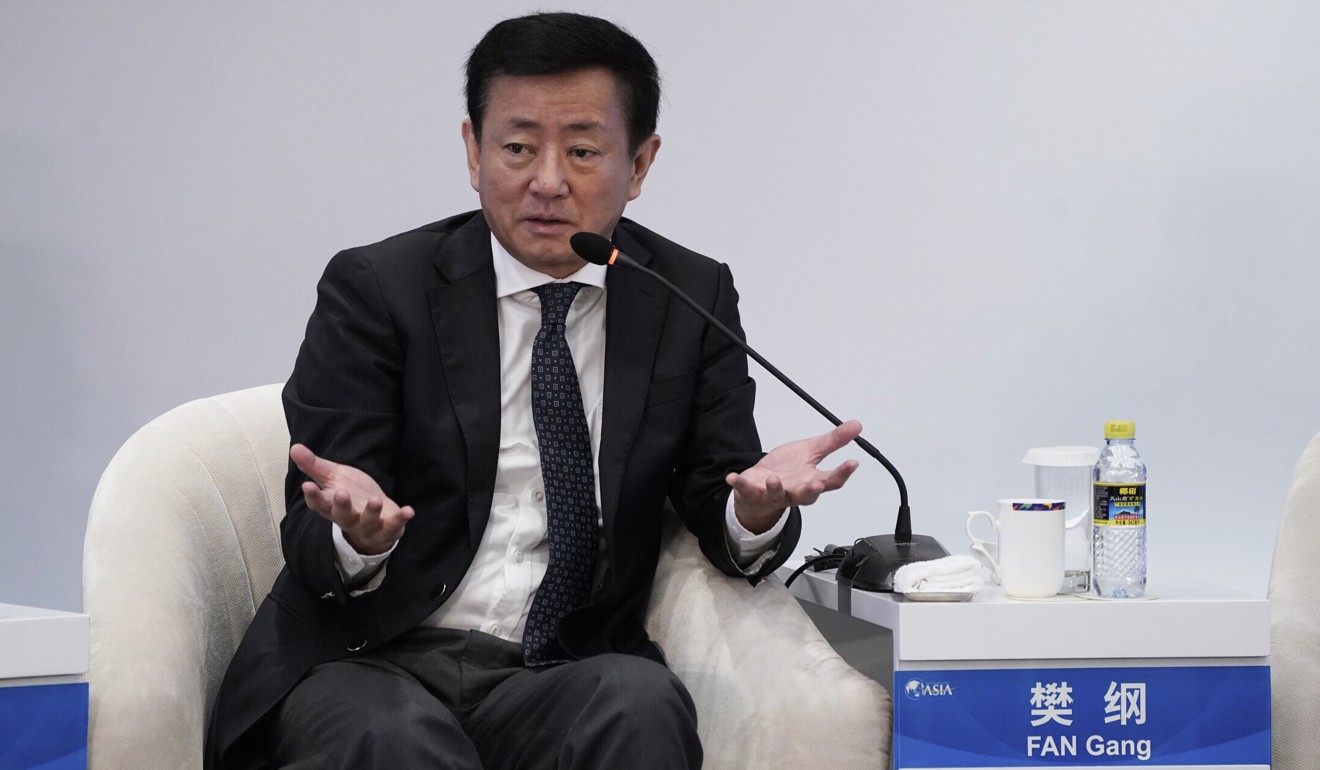
No quick fix to US-China trade war – even with a Trump-Xi meeting, top Beijing economic adviser says
- Short-term progress on intellectual property protection or opening up China’s marketplace doubtful, Fan Gang tells Harvard University audience
- Fan says he is pessimistic about US-China ties ‘in the short-run and the long run’
Beijing and Washington are unlikely to reach a deal on intellectual property rights or further opening up of China’s financial market – even if the leaders of the two countries meet later this month, a key Chinese government adviser said.
“What they were negotiating in Beijing and Washington in the past round [of talks earlier this year] was mostly about trade itself,” Fan Gang, a former member of the monetary policy committee of the People’s Bank of China, said in a speech at Harvard University on Wednesday.
Since the countries had not even begun to discuss the two issues at the heart of the trade war, it was “hard to have a solution” to the dispute, Fan said.
When asked whether China would improve its intellectual property protection and further open up its financial market to ease trade tensions with Washington, Fan said the reforms were necessary but would not come quickly.
“The reforms may change the position of the other side, but it will take some time. It’s not a short-term issue. It’s a midterm issue,” Fan said.
Chinese President Xi Jinping is expected to meet his US counterpart Donald Trump on the sidelines of the G20 summit in Buenos Aires at the end of this month.
They are not talking about trade … Buying doesn’t solve the problem
Analysts on both sides have expressed confidence recently that Beijing and Washington might reach a truce over the trade dispute during the summit, in the two leaders’ first meeting since a tit-for-tat trade war between their nations broke out in July.
But Fan, a leader in an economists’ club founded by Chinese Vice-Premier Liu He, said he was pessimistic about bilateral ties “in the short-run and the long run”. Liu had led several rounds of trade negotiations this year with Trump administration officials including Treasury Secretary Steven Mnuchin.
“I don’t think in the short-run you can reach an agreement,” Fan said. “How can you reach agreements with Donald Trump and his team? They are not talking about trade. How much can China actually buy? Buying doesn’t solve the problem.”

The economist said he expected the ideological conflicts from the trade war to last.
“It’s about internet control, it’s about ideology, it’s about national security and so-called political superiority,” he said. “In the long run, it’s hard to have a solution.”
I think the United States is united on China
Fan also acknowledged the consensus on China’s trade practice across the US political spectrum.
“It was the [US midterm] election day yesterday and anything seems to be a controversy, but I think the United States is united on China,” he said.
His comments came as Washington continued to express concern about China’s ambitious manufacturing plan, “Made in China 2025”, which channels state funds to domestic companies developing advanced technologies in robotics, telecommunications and aviation.
The initiative, which aims to break China’s reliance on foreign technology and pull its hi-tech industries up to Western levels, has become a lightning rod for Washington’s – and Trump’s – ire in the trade war with Beijing.
In a post-midterm-election address on Wednesday, Trump called Made in China 2025 “insulting” and suggested Beijing was backing away from it.
Fan stressed that continuing the initiative was beyond question.
Nevertheless, his views reflected a school of thought within Beijing that boldly favours China and the United States reaching a compromise to reduce the intensity of the trade tensions. He said the trade war had accelerated China’s long-needed market reform.
“There are so many things that the Chinese central leadership has agreed to do, committed to doing, but didn’t do for such a long time,” Fan said. “After the trade war, a lot of things started moving.”
Watch: Amid trade war, Trump and Xi talk over the phone
He cited China’s lifting of ownership limits for foreign car firms in April, which enticed US carmaker Tesla to build a plant in Shanghai; a further opening of the Chinese financial market; and lowering of tariffs as examples of trade war-impelled changes that have happened in recent months.
Other Washington policymakers, including Danny Russel, a former assistant secretary of state for East Asian and Pacific affairs, agreed that any deal between Trump and Xi at G20 would be limited or incremental if at all.
He said the Trump administration had publicly aired “such a list of offences by China, that are shared not only by the business community or the policy community but by Congress, that it may be hard for the administration to simply set those issues aside and say, ‘We’ve reached a deal on the trade figures, but we haven’t dealt with forced transfer of technology, of cybertheft, of intellectual policy, of the industrial policy of Made in China 2025’”.
Russel made his remarks at an Asia Society round table discussion in New York on Wednesday.
“If you don’t have a very clear direction of where to go, you confused the ministries and people who implement the policies,” Fan said of the central leadership’s shifting position on market reforms.
“You can’t blame all the problems on lower level bureaucrats,” he said. “That’s why I called the trade war a wake-up call.”
Additional reporting by Robert Delaney

